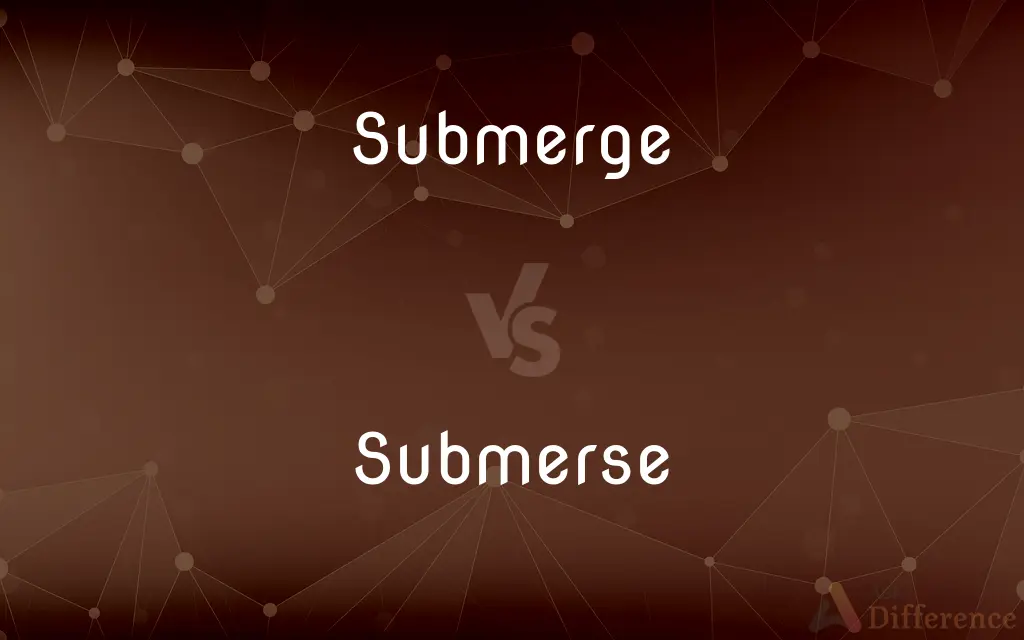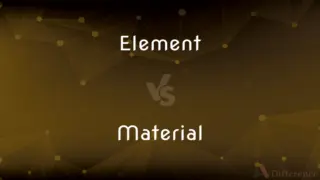Submerge vs. Submerse — What's the Difference?
By Tayyaba Rehman — Updated on September 24, 2023
"Submerge" means to cause to go under water or another liquid, while "Submerse" is synonymous but less commonly used, often implying being submerged briefly.

Difference Between Submerge and Submerse
Table of Contents
ADVERTISEMENT
Key Differences
"Submerge" and "Submerse" are verbs with similar meanings, often used interchangeably, but they have subtle differences and unique usages. "Submerge" primarily implies the action of going or causing to go under water or another liquid, often used to describe objects or land. It tends to emphasize the condition of being under a surface, symbolizing complete engulfment or immersion, such as a submarine submerging beneath the ocean waves.
In comparison, "Submerse" is less commonly used but generally synonymous with "submerge." However, "Submerse" often implies a temporary or brief immersion in liquid, conveying a sense of partial or momentary submersion. It may be used to describe actions like dipping one’s hand in water briefly. The term "Submerse" may also suggest being overwhelmed or engulfed, typically in a non-literal or metaphorical sense, such as being submersed in work or emotions.
The distinction between "Submerge" and "Submerse" is subtle, revolving primarily around duration and depth of immersion. "Submerge" often connotes a more prolonged or deeper immersion, potentially highlighting the idea of being completely covered or concealed by a liquid. In contrast, "Submerse" can emphasize the temporary and brief nature of the immersion, which may not always be complete or profound.
Though subtle, recognizing the nuanced distinction between these terms can enhance expressive precision in language use. "Submerge" is more prevalent and versatile, applicable in diverse contexts and disciplines, including science, literature, and everyday communication. "Submerse," with its nuanced implication, adds a layer of specificity, particularly beneficial in contexts demanding exactness and detail in expression.
Comparison Chart
Frequency of Use
More commonly used
Less commonly used
ADVERTISEMENT
Duration & Depth
Implies deeper, prolonged immersion
Often implies brief, partial immersion
Synonymy
Typically synonymous with submerse
Synonymous but with nuanced differences
Example
The ship will submerge at dawn.
He had to submerse his hand quickly.
Contextual Use
More versatile in application
More specific in its implication
Compare with Definitions
Submerge
To sink below the surface of the water.
The sunken ship submergeed further into the ocean depths.
Submerse
To plunge into a liquid; immerse.
I had to quickly submerse my burned hand into cold water.
Submerge
To cause to go under water or another liquid.
We watched the submarine submerge.
Submerse
To occupy completely; engross.
He was so submersed in his book that he lost track of time.
Submerge
To cover or overflow with water; inundate.
The town was submergeed during the heavy rainfall.
Submerse
To be submerged in a liquid.
The artifact was submersed in a chemical solution.
Submerge
To immerse oneself deeply in a particular activity or interest.
She chose to submerge herself in her studies.
Submerse
To cover or flood with water.
The heavy rains submersed the low-lying areas.
Submerge
To hide or suppress; conceal.
He tried to submerge his true feelings.
Submerse
To place under the surface of a liquid; dip.
The chef submersed the vegetables in boiling water.
Submerge
To place under the surface of a liquid, especially water
Submerged the pieces of chicken in the broth.
Submerse
To submerge.
Submerge
To cover with water or another liquid; inundate
The flood submerged the road.
Submerse
To submerge.
Submerge
To hide from view; obscure
"The few public tributes to Nat Turner in the mainstream black press of the late 1950s submerged the armed rebellion within a narrative of nonviolent protest" (Scot French).
Submerse
(botany) Growing entirely under water.
Submerge
To go under the surface of a body of water
The submarine submerged quickly to avoid detection.
Submerse
Submersed.
Submerge
To disappear as if by going under water.
Submerse
Sink below the surface; go under or as if under water
Submerge
(intransitive) To sink out of sight.
The submarine submerged in the water.
Submerse
Put under water;
Submerge your head completely
Submerge
(transitive) To put into a liquid; to immerse; to plunge into and keep in.
In films many people are murdered by being submerged in swimming pools.
Submerge
To engulf or overwhelm.
Because of the death of his father, he is submerged in sorrow.
Submerge
To put under water; to plunge.
Submerge
To cover or overflow with water; to inundate; to flood; to drown.
I would thou didst,So half my Egypt were submerged.
Submerge
To plunge into water or other fluid; to be buried or covered, as by a fluid; to be merged; hence, to be completely included.
Some say swallows submerge in ponds.
Submerge
Sink below the surface; go under or as if under water
Submerge
Cover completely or make imperceptible;
I was drowned in work
The noise drowned out her speech
Submerge
Put under water;
Submerge your head completely
Submerge
Fill or cover completely, usually with water
Common Curiosities
Is "Submerge" versatile in its application?
Absolutely, "Submerge" is versatile and can be used in various contexts and disciplines, including everyday communication.
Does "Submerse" often imply a temporary or brief immersion?
Yes, "Submerse" often conveys a sense of temporary or brief immersion in a liquid.
Can "Submerge" imply a more prolonged or deeper immersion?
Yes, "Submerge" typically implies a condition of being completely under a liquid, often more prolonged or deeper.
Can "Submerse" refer to being overwhelmed in non-literal contexts?
Yes, "Submerse" can metaphorically refer to being overwhelmed or engrossed, such as being submersed in work.
Is "Submerse" nuanced in its implication?
Yes, "Submerse" carries nuanced implications, often relating to the duration and depth of immersion.
Is "Submerge" more formal in usage compared to "Submerse"?
While both can be used formally, "Submerge" is more commonly utilized in formal contexts due to its prevalence.
Is "Submerge" used more commonly than "Submerse"?
Yes, "Submerge" is more commonly used in both formal and informal contexts.
Is "Submerge" suitable for expressing complete concealment or covering by a liquid?
Yes, "Submerge" is suitable for expressing the idea of being completely concealed or covered by a liquid.
Are "Submerge" and "Submerse" synonyms?
Yes, they are generally synonymous, but "Submerse" is less commonly used and often implies brief immersion.
Can "Submerge" be used to describe the sinking of ships?
Yes, "Submerge" is apt for describing situations where ships or objects sink below the water's surface.
Can "Submerse" be used to describe submersion in abstract terms?
Yes, "Submerse" can be used to describe being deeply engrossed or submerged in abstract concepts or activities.
Is "Submerse" used to describe momentary actions?
Often, "Submerse" can emphasize momentary or brief actions, like dipping a hand in water briefly.
Can the use of "Submerse" add a layer of specificity in expression?
Yes, "Submerse," with its nuanced implication, can add a layer of specificity and detail in expression.
Are both "Submerge" and "Submerse" used in the context of liquids?
Yes, both terms are predominantly used to describe the action or state of being under a liquid.
Does "Submerge" imply being sunk or placed under water?
Yes, "Submerge" implies being sunk or placed under water or another liquid.
Share Your Discovery

Previous Comparison
Cossack vs. Kazakh
Next Comparison
Element vs. MaterialAuthor Spotlight
Written by
Tayyaba RehmanTayyaba Rehman is a distinguished writer, currently serving as a primary contributor to askdifference.com. As a researcher in semantics and etymology, Tayyaba's passion for the complexity of languages and their distinctions has found a perfect home on the platform. Tayyaba delves into the intricacies of language, distinguishing between commonly confused words and phrases, thereby providing clarity for readers worldwide.














































